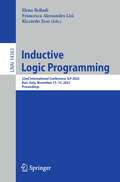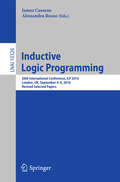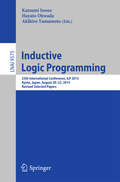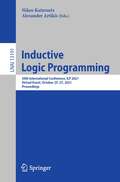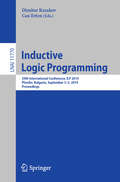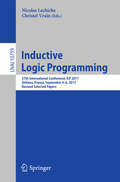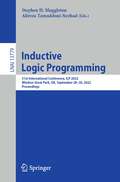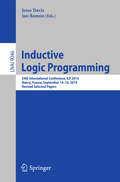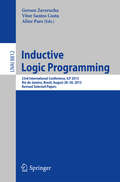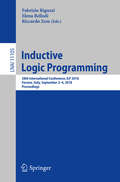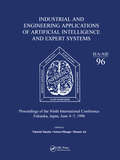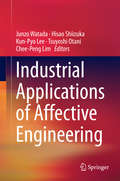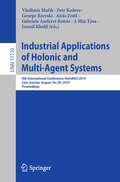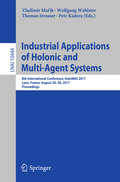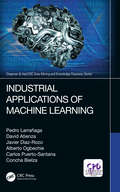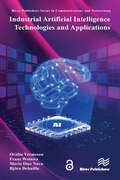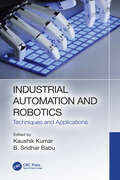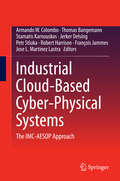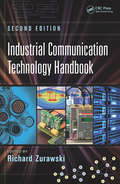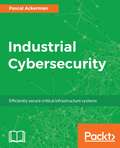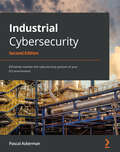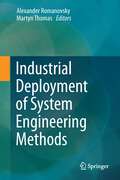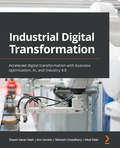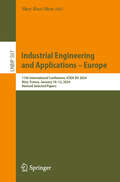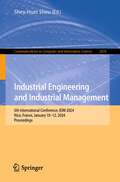- Table View
- List View
Inductive Logic Programming: 32nd International Conference, ILP 2023, Bari, Italy, November 13–15, 2023, Proceedings (Lecture Notes in Computer Science #14363)
by Elena Bellodi Francesca Alessandra Lisi Riccardo ZeseThis book constitutes the refereed proceedings of the 32nd International Conference on Inductive Logic Programming, ILP 2023, held in Bari, Italy, during November 13–15, 2023.The 11 full papers and 1 short paper included in this book were carefully reviewed and selected from 18 submissions. They cover all aspects of learning in logic, multi-relational data mining, statistical relational learning, graph and tree mining, learning in other (non-propositional) logic-based knowledge representation frameworks, exploring intersections to statistical learning and other probabilistic approaches.
Inductive Logic Programming
by James Cussens Alessandra RussoThis book constitutes the thoroughly refereed post-conference proceedings of the 26th International Conference on Inductive Logic Programming, ILP 2016, held in London, UK, in September 2016. The 10 full papers presented were carefully reviewed and selected from 29 submissions. The papers represent well the current breath of ILP research topics such as predicate invention; graph-based learning; spatial learning; logical foundations; statistical relational learning; probabilistic ILP; implementation and scalability; applications in robotics, cyber security and games.
Inductive Logic Programming
by Katsumi Inoue Hayato Ohwada Akihiro YamamotoThis book constitutes the thoroughly refereed post-conference proceedings of the 25th International Conference on Inductive Logic Programming, ILP 2015, held in Kyoto, Japan, in August 2015. The 14 revised papers presented were carefully reviewed and selected from 44 submissions. The papers focus on topics such as theories, algorithms, representations and languages, systems and applications of ILP, and cover all areas of learning in logic, relational learning, relational data mining, statistical relational learning, multi-relational data mining, relational reinforcement learning, graph mining, connections with other learning paradigms, among others.
Inductive Logic Programming: 30th International Conference, ILP 2021, Virtual Event, October 25–27, 2021, Proceedings (Lecture Notes in Computer Science #13191)
by Nikos Katzouris Alexander ArtikisThis book constitutes the refereed conference proceedings of the 30th International Conference on Inductive Logic Programming, ILP 2032, held in October 2021. Due to COVID-19 pandemic the conference was held virtually. The 16 papers and 3 short papers presented were carefully reviewed and selected from 19 submissions. Inductive Logic Programming (ILP) is a subfield of machine learning, which originally relied on logic programming as a uniform representation language for expressing examples, background knowledge and hypotheses. Due to its strong representation formalism, based on first-order logic, ILP provides an excellent means for multi-relational learning and data mining, and more generally for learning from structured data.
Inductive Logic Programming: 29th International Conference, ILP 2019, Plovdiv, Bulgaria, September 3–5, 2019, Proceedings (Lecture Notes in Computer Science #11770)
by Dimitar Kazakov Can ErtenThis book constitutes the refereed conference proceedings of the 29th International Conference on Inductive Logic Programming, ILP 2019, held in Plovdiv, Bulgaria, in September 2019. The 11 papers presented were carefully reviewed and selected from numerous submissions. Inductive Logic Programming (ILP) is a subfield of machine learning, which originally relied on logic programming as a uniform representation language for expressing examples, background knowledge and hypotheses. Due to its strong representation formalism, based on first-order logic, ILP provides an excellent means for multi-relational learning and data mining, and more generally for learning from structured data.
Inductive Logic Programming: 27th International Conference, Ilp 2017, Orléans, France, September 4-6, 2017, Revised Selected Papers (Lecture Notes in Computer Science #10759)
by Nicolas Lachiche Christel VrainThis book constitutes the thoroughly refereed post-conference proceedings of the 27th International Conference on Inductive Logic Programming, ILP 2017, held in Orléans, France, in September 2017. The 12 full papers presented were carefully reviewed and selected from numerous submissions. Inductive Logic Programming (ILP) is a subfield of machine learning, which originally relied on logic programming as a uniform representation language for expressing examples, background knowledge and hypotheses. Due to its strong representation formalism, based on first-order logic, ILP provides an excellent means for multi-relational learning and data mining, and more generally for learning from structured data.
Inductive Logic Programming: 31st International Conference, ILP 2022, Windsor Great Park, UK, September 28–30, 2022, Proceedings (Lecture Notes in Computer Science #13779)
by Stephen H. Muggleton Alireza Tamaddoni-NezhadThis book constitutes the refereed proceedings of the 31st International Conference on Inductive Logic Programming, ILP 2022, held during September 28-30, 2022.The 11 regular papers presented in this book were carefully reviewed and selected from 26 submissions The papers in these proceedings represent the diversity and vitality in present ILP research, including statistical relational learning, transfer learning, scientific reasoning, learning temporal models, synthesis and planning, and argumentation and language.
Inductive Logic Programming
by Jan Ramon Jesse DavisThis book constitutes the thoroughly refereed post-conference proceedings of the 24th International Conference on Inductive Logic Programming, ILP 2014, held in Nancy, France, in September 2014. The 14 revised papers presented were carefully reviewed and selected from 41 submissions. The papers focus on topics such as the inducing of logic programs, learning from data represented with logic, multi-relational machine learning, learning from graphs, and applications of these techniques to important problems in fields like bioinformatics, medicine, and text mining.
Inductive Logic Programming
by Gerson Zaverucha Vítor Santos Costa Aline PaesThis book constitutes the thoroughly refereed post-proceedings of the 23rd International Conference on Inductive Logic Programming, ILP 2013, held in Rio de Janeiro, Brazil, in August 2013. The 9 revised extended papers were carefully reviewed and selected from 42 submissions. The conference now focuses on all aspects of learning in logic, multi-relational learning and data mining, statistical relational learning, graph and tree mining, relational reinforcement learning, and other forms of learning from structured data.
Inductive Logic Programming: 28th International Conference, ILP 2018, Ferrara, Italy, September 2–4, 2018, Proceedings (Lecture Notes in Computer Science #11105)
by Riccardo Zese Elena Bellodi Fabrizio RiguzziThis book constitutes the refereed conference proceedings of the 28th International Conference on Inductive Logic Programming, ILP 2018, held in Ferrara, Italy, in September 2018. The 10 full papers presented were carefully reviewed and selected from numerous submissions. Inductive Logic Programming (ILP) is a subfield of machine learning, which originally relied on logic programming as a uniform representation language for expressing examples, background knowledge and hypotheses. Due to its strong representation formalism, based on first-order logic, ILP provides an excellent means for multi-relational learning and data mining, and more generally for learning from structured data.
Industrial and Engineering Applications or Artificial Intelligence and Expert Systems
by Takushi Tanaka; Setsuo Ohsuga; Moonis AliThis volume includes the proceedings from Proceedings of the Ninth International Conference Fukuoka, Japan, June 4-7, 1996. This work represents a broad spectrum of new ideas in the field of applied artificial intelligence and expert systems, and serves to disseminate information regarding intelligent methodologies and their implementation in solving various problems in industry and engineering.
Industrial Applications of Affective Engineering
by Junzo Watada Hisao Shiizuka Kun-Pyo Lee Tsuyoshi Otani Chee-Peng LimIndustrial Applications of Affective Engineering introduces new analytical methods such as fluctuation, fuzzy logic, fractals, and complex systems, and pursuing interdisciplinary research that traverses a wide range of fields, including information engineering, human engineering, cognitive science, psychology, and design studies. The book is split into two parts: theory and applications. The book is a collection of the best papers from ISAE2013 (International Symposium of Affective Engineering) held at Kitakyushu, Japan and Japan Kansei Engineering Meeting on March 6-8, 2013.
Industrial Applications of Holonic and Multi-Agent Systems: 9th International Conference, HoloMAS 2019, Linz, Austria, August 26–29, 2019, Proceedings (Lecture Notes in Computer Science #11710)
by Vladimír Mařík Petr Kadera George Rzevski Alois Zoitl Gabriele Anderst-Kotsis A Min Tjoa Ismail KhalilThis book constitutes the refereed proceedings of the 9th International Conference on Industrial Applications of Holonic and Multi-Agent Systems, HoloMAS 2019, held in Linz, Austria, in August 2019. The 14 full papers presented were carefully reviewed and selected from 15 submissions, and 2 invited papers were also included. The papers are organized in the following topical sections: invited talks; methodologies and framework; agent-based production scheduling and control; data and knowledge; and MAS in various areas.
Industrial Applications of Holonic and Multi-Agent Systems
by Vladimír Mařík Wolfgang Wahlster Thomas Strasser Petr KaderaThis book constitutes the refereed proceedings of the 8th International Conference on Industrial Applications of Holonic and Multi-Agent Systems, HoloMAS 2017, held in Lyon, France, in August 2017. The 19 revised full papers presented were carefully reviewed and selected from 27 submissions. The papers are organized in the following topical sections: scheduling; knowledge engineering; modeling, simulation and reconfiguration; energy systems;and MAS in various areas.
Industrial Applications of Machine Learning (Chapman & Hall/CRC Data Mining and Knowledge Discovery Series)
by Carlos Esteban Puerto-Santana Pedro Larrañaga David Atienza Javier Diaz-Rozo Alberto Ogbechie Concha BielzaIndustrial Applications of Machine Learning shows how machine learning can be applied to address real-world problems in the fourth industrial revolution, and provides the required knowledge and tools to empower readers to build their own solutions based on theory and practice. The book introduces the fourth industrial revolution and its current impact on organizations and society. It explores machine learning fundamentals, and includes four case studies that address a real-world problem in the manufacturing or logistics domains, and approaches machine learning solutions from an application-oriented point of view. The book should be of special interest to researchers interested in real-world industrial problems. <P><P>Features <li>Describes the opportunities, challenges, issues, and trends offered by the fourth industrial revolution <li>Provides a user-friendly introduction to machine learning with examples of cutting-edge applications in different industrial sectors <li>Includes four case studies addressing real-world industrial problems solved with machine learning techniques <li>A dedicated website for the book contains the datasets of the case studies for the reader's reproduction, enabling the groundwork for future problem-solving <li>Uses of three of the most widespread software and programming languages within the engineering and data science communities, namely R, Python, and Weka
Industrial Artificial Intelligence Technologies and Applications
by Ovidiu Vermesan Franz Wotawa Mario Diaz Nava Björn DebaillieThe advances in industrial edge artificial intelligence (AI) are transforming the way industrial equipment and machines interact with the real world, with other machines and humans during manufacturing processes. These advances allow Industrial Internet of Things (IIoT) and edge devices to make decisions during the manufacturing processes using sensors and actuators. Digital transformation is reshaping the manufacturing industry, and industrial edge AI aims to combine the potential advantages of edge computing (low latency times, reduced bandwidth, distributed architecture, improved trustworthiness, etc.) with the benefits of AI (intelligent processing, predictive solutions, classification, reasoning, etc.). The industrial environments allow the deployment of highly distributed intelligent industrial applications in remote sites that require reliable connectivity over wireless and cellular connections. Intelligent connectivity combines IIoT, wireless/cellular and AI technologies to support new autonomous industrial applications by enabling AI capabilities at the edge and allowing manufacturing companies to improve operational efficiency and reduce risks and costs for industrial applications. There are several critical issues to consider when introducing AI to industrial IoT applications considering training AI models at the edge, the deployment of the AI-trained inferencing models on the target edge hardware platforms, and the benchmarking of solutions compared to other implementations. Next-generation trustworthy industrial AI systems offer dependability in terms of their design, transparency, explainability, verifiability, and standardised industrial solutions can be implemented in various applications across different industrial sectors. New AI techniques such as embedded machine learning (ML) and deep learning (DL), capture edge data, employ AI models, and deploy these in hardware target edge devices, from ultra-low-power microcontrollers to embedded devices, gateways, and on-premises servers for industrial applications. These techniques reduce latency, increase scalability, reliability, and resilience; and optimise wireless connectivity, greatly expanding the capabilities of the IIoT. This book provides an overview of the latest research results and activities in industrial AI technologies and applications, based on the innovative research, developments and ideas generated by the ECSEL JU AI4DI, ANDANTE and TEMPO projects. The authors describe industrial AI's challenges, the approaches adopted, and the main industrial systems and applications to give the reader extensive insight into the technical nature of this field. The chapters provide insightful material on industrial AI technologies and applications. This book is a valuable resource for researchers, post-graduate students, practitioners, and technoloyg developers interested in gaining insight into industrial edge AI, the IIoT, embedded machine and deep learning, new technologies, and solutions to advance intelligent processing at the edge.
Industrial Automation and Robotics: Techniques and Applications
by Kaushik Kumar Sridhar B. BabuThis book discusses the radical technological changes occurring due to Industry 4.0, with a focus on offering a better understanding of the Fourth Industrial Revolution. It also presents a detailed analysis of interdisciplinary knowledge, numerical modeling and simulation, and the application of cyber–physical systems, where information technology and physical devices create synergic systems leading to unprecedented efficiency. The book focuses on industrial applications of automation and robotics. It covers recent developments and trends occurring in both computer-aided manufacturing techniques, as well as computer-aided assembly techniques. Robots using embedded systems and artificial intelligence applications are also covered. Industrial Automation and Robotics: Techniques and Applications offers theoretical results, practical solutions, and guidelines that are valuable for both researchers and those working in the area of engineering.
Industrial Cloud-Based Cyber-Physical Systems
by Armando W. Colombo Thomas Bangemann Stamatis Karnouskos Jerker Delsing Petr Stluka Robert Harrison Francois Jammes Jose L. LastraThis book presents cutting-edge emerging technologies and approaches in the areas of service-oriented architectures, intelligent devices and cloud-based cyber-physical systems. It provides a clear view on their applicability to the management and automation of manufacturing and process industries. It offers a holistic view of future industrial cyber-physical systems and their industrial usage and also depicts technologies and architectures as well as a migration approach and engineering tools based on these. By providing a careful balance between the theory and the practical aspects, this book has been authored by several experts from academia and industry, thereby offering a valuable understanding of the vision, the domain, the processes and the results of the research. It has several illustrations and tables to clearly exemplify the concepts and results examined in the text and these are supported by four real-life case-studies. We are witnessing rapid advances in the industrial automation, mainly driven by business needs towards agility and supported by new disruptive advances both on the software and hardware side, as well as the cross-fertilization of concepts and the amalgamation of information and communication technology-driven approaches in traditional industrial automation and control systems. This book is intended for technology managers, application designers, solution developers, engineers working in industry, as well as researchers, undergraduate and graduate students of industrial automation, industrial informatics and production engineering.
Industrial Communication Technology Handbook (Industrial Information Technology #8)
by Richard ZurawskiFeaturing contributions from major technology vendors, industry consortia, and government and private research establishments, the Industrial Communication Technology Handbook, Second Edition provides comprehensive and authoritative coverage of wire- and wireless-based specialized communication networks used in plant and factory automation, automotive applications, avionics, building automation, energy and power systems, train applications, and more. New to the Second Edition: 46 brand-new chapters and 21 substantially revised chapters Inclusion of the latest, most significant developments in specialized communication technologies and systems Addition of new application domains for specialized networks The Industrial Communication Technology Handbook, Second Edition supplies readers with a thorough understanding of the application-specific requirements for communication services and their supporting technologies. It is useful to a broad spectrum of professionals involved in the conception, design, development, standardization, and use of specialized communication networks as well as academic institutions engaged in engineering education and vocational training.
Industrial Cybersecurity
by Pascal AckermanYour one-step guide to understanding industrial cyber security, its control systems, and its operations. About This Book • Learn about endpoint protection such as anti-malware implementation, updating, monitoring, and sanitizing user workloads and mobile devices • Filled with practical examples to help you secure critical infrastructure systems efficiently • A step-by-step guide that will teach you the techniques and methodologies of building robust infrastructure systems Who This Book Is For If you are a security professional and want to ensure a robust environment for critical infrastructure systems, this book is for you. IT professionals interested in getting into the cyber security domain or who are looking at gaining industrial cyber security certifications will also find this book useful. What You Will Learn • Understand industrial cybersecurity, its control systems and operations • Design security-oriented architectures, network segmentation, and security support services • Configure event monitoring systems, anti-malware applications, and endpoint security • Gain knowledge of ICS risks, threat detection, and access management • Learn about patch management and life cycle management • Secure your industrial control systems from design through retirement In Detail With industries expanding, cyber attacks have increased significantly. Understanding your control system's vulnerabilities and learning techniques to defend critical infrastructure systems from cyber threats is increasingly important. With the help of real-world use cases, this book will teach you the methodologies and security measures necessary to protect critical infrastructure systems and will get you up to speed with identifying unique challenges.Industrial cybersecurity begins by introducing Industrial Control System (ICS) technology, including ICS architectures, communication media, and protocols. This is followed by a presentation on ICS (in) security. After presenting an ICS-related attack scenario, securing of the ICS is discussed, including topics such as network segmentation, defense-in-depth strategies, and protective solutions. Along with practical examples for protecting industrial control systems, this book details security assessments, risk management, and security program development. It also covers essential cybersecurity aspects, such as threat detection and access management. Topics related to endpoint hardening such as monitoring, updating, and anti-malware implementations are also discussed. Style and approach A step-by-step guide to implement Industrial Cyber Security effectively.
Industrial Cybersecurity: Efficiently monitor the cybersecurity posture of your ICS environment, 2nd Edition
by Pascal AckermanGet up and running with industrial cybersecurity monitoring with this hands-on book, and explore ICS cybersecurity monitoring tasks, activities, tools, and best practicesKey FeaturesArchitect, design, and build ICS networks with security in mindPerform a variety of security assessments, checks, and verificationsEnsure that your security processes are effective, complete, and relevantBook DescriptionWith Industrial Control Systems (ICS) expanding into traditional IT space and even into the cloud, the attack surface of ICS environments has increased significantly, making it crucial to recognize your ICS vulnerabilities and implement advanced techniques for monitoring and defending against rapidly evolving cyber threats to critical infrastructure. This second edition covers the updated Industrial Demilitarized Zone (IDMZ) architecture and shows you how to implement, verify, and monitor a holistic security program for your ICS environment. You'll begin by learning how to design security-oriented architecture that allows you to implement the tools, techniques, and activities covered in this book effectively and easily. You'll get to grips with the monitoring, tracking, and trending (visualizing) and procedures of ICS cybersecurity risks as well as understand the overall security program and posture/hygiene of the ICS environment. The book then introduces you to threat hunting principles, tools, and techniques to help you identify malicious activity successfully. Finally, you'll work with incident response and incident recovery tools and techniques in an ICS environment. By the end of this book, you'll have gained a solid understanding of industrial cybersecurity monitoring, assessments, incident response activities, as well as threat hunting.What you will learnMonitor the ICS security posture actively as well as passivelyRespond to incidents in a controlled and standard wayUnderstand what incident response activities are required in your ICS environmentPerform threat-hunting exercises using the Elasticsearch, Logstash, and Kibana (ELK) stackAssess the overall effectiveness of your ICS cybersecurity programDiscover tools, techniques, methodologies, and activities to perform risk assessments for your ICS environmentWho this book is forIf you are an ICS security professional or anyone curious about ICS cybersecurity for extending, improving, monitoring, and validating your ICS cybersecurity posture, then this book is for you. IT/OT professionals interested in entering the ICS cybersecurity monitoring domain or searching for additional learning material for different industry-leading cybersecurity certifications will also find this book useful.
Industrial Deployment of System Engineering Methods
by Martyn Thomas Alexander RomanovskyA formal method is not the main engine of a development process, its contribution is to improve system dependability by motivating formalisation where useful. This book summarizes the results of the DEPLOY research project on engineering methods for dependable systems through the industrial deployment of formal methods in software development. The applications considered were in automotive, aerospace, railway, and enterprise information systems, and microprocessor design. The project introduced a formal method, Event-B, into several industrial organisations and built on the lessons learned to provide an ecosystem of better tools, documentation and support to help others to select and introduce rigorous systems engineering methods. The contributing authors report on these projects and the lessons learned. For the academic and research partners and the tool vendors, the project identified improvements required in the methods and supporting tools, while the industrial partners learned about the value of formal methods in general. A particular feature of the book is the frank assessment of the managerial and organisational challenges, the weaknesses in some current methods and supporting tools, and the ways in which they can be successfully overcome. The book will be of value to academic researchers, systems and software engineers developing critical systems, industrial managers, policymakers, and regulators.
Industrial Digital Transformation: Accelerate digital transformation with business optimization, AI, and Industry 4.0
by Shyam Varan Nath Ann Dunkin Mahesh Chowdhary Nital PatelDelve into industrial digital transformation and learn how to implement modern business strategies powered by digital technologies as well as organization and cultural optimizationKey FeaturesIdentify potential industry disruptors from various business domains and emerging technologiesLeverage existing resources to identify new avenues for generating digital revenueBoost digital transformation with cloud computing, big data, artificial intelligence (AI), and the Internet of Things (IoT)Book DescriptionDigital transformation requires the ability to identify opportunities across industries and apply the right technologies and tools to achieve results. This book is divided into two parts with the first covering what digital transformation is and why it is important. The second part focuses on how digital transformation works.After an introduction to digital transformation, you will explore the transformation journey in logical steps and understand how to build business cases and create productivity benefit statements. Next, you'll delve into advanced topics relating to overcoming various challenges. Later, the book will take you through case studies in both private and public sector organizations. You'll explore private sector organizations such as industrial and hi-tech manufacturing in detail and get to grips with public sector organizations by learning how transformation can be achieved on a global scale and how the resident experience can be improved. In addition to this, you will understand the role of artificial intelligence, machine learning and deep learning in digital transformation. Finally, you'll discover how to create a playbook that can ensure success in digital transformation.By the end of this book, you'll be well-versed with industrial digital transformation and be able to apply your skills in the real world.What you will learnGet up to speed with digital transformation and its important aspectsExplore the skills that are needed to execute the transformationFocus on the concepts of Digital Thread and Digital TwinUnderstand how to leverage the ecosystem for successful transformationGet to grips with various case studies spanning industries in both private and public sectorsDiscover how to execute transformation at a global scaleFind out how AI delivers value in the transformation journeyWho this book is forThis book is for IT leaders, digital strategy leaders, line-of-business leaders, solution architects, and IT business partners looking for digital transformation opportunities within their organizations. Professionals from service and management consulting firms will also find this book useful. Basic knowledge of enterprise IT and some intermediate knowledge of identifying digital revenue streams or internal transformation opportunities are required to get started with this book.
Industrial Engineering and Applications – Europe: 11th International Conference, ICIEA-EU 2024, Nice, France, January 10–12, 2024, Revised Selected Papers (Lecture Notes in Business Information Processing #507)
by Shey-Huei SheuThis book constitutes the refereed post-proceedings of the 11th International Conference on Industrial Engineering and Applications, ICIEA 2024, held in Nice, France, during January 10-12, 2024. The 16 full papers and 3 short papers included in this book were carefully reviewed and selected from 90 submissions. They focus on the most recent and relevant research, theories and practices in industrial engineering and its applications.
Industrial Engineering and Industrial Management: 5th International Conference, IEIM 2024, Nice, France, January 10–12, 2024, Proceedings (Communications in Computer and Information Science #2070)
by Shey-Huei SheuThis CCIS post conference volume constitutes the proceedings of the 5th International Conference, IEIM 2024, in Nice, France, in January 2024. The 18 full papers together with 3 short papers in this volume were carefully reviewed and selected from 71 submissions. The were organized in 5 tracks as follows: five topics of IEIM were classified as follows: “Data Analysis and Demand Calculation in Industrial Production”, “Process Optimization and Intelligence in Green Manufacturing Systems”, “Lean Manufacturing and Process Optimization”, “Enterprise Digital Transformation and Business Management” and “Modern Logistics Information Systems and Distribution Services”.
